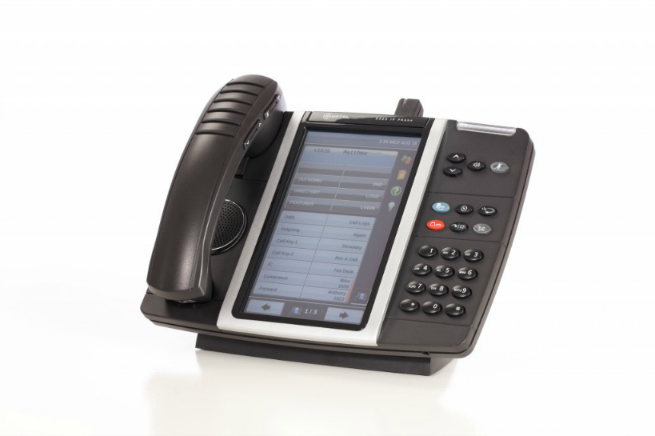While it’s necessary to follow the rules of phone etiquette to make and maintain a positive impression of your business in the minds of callers, it’s also critical that you have a system in place that can provide a positive calling experience when you’re not available to pick up the phone. Odyssey systems auto-attendant was designed for that very purpose.
We’ll record a professional greeting that will make the right impression on everyone who calls your establishment. Your auto-attendant can relay critical information that your clients simply can’t wait to get as well, such as your hours of operation or your current specials. To learn more about how an auto-attendant from Odyssey systems can help your business make a lasting, professional impression on your callers, contact us today.

-
-
In May 2018 rules come into force that could make it much more difficult for employees to use their own mobile phones, tablets and laptops at work.
The General Data Protection Regulation, an EU Directive which mandates that companies handling data about or on behalf of their clients must appoint a Data Protection Officer, imposes heavy fines for loss of data.
You might ask, what has this got to do with people checking their work emails on their phones or working from home using their own laptop?
There are three main data risks with a allowing a Bring Your Own Device (BYOD) policy; the physical loss of a device, a device being compromised with malicious software, and the transmission of data over unsecured networks.
The easiest way to get around security issues with employees’ devices is to issue them with company owned and managed technology. This means every aspect of security can be controlled centrally, for companies willing to pay for this.
Some companies may ask employees that want to use their own phones, tablets and computers to bring them within the company’s security ecosystem, but such a policy may not go down well with privacy conscious individuals, especially if they are required to access the internet via a permanent VPN.
One simple solution is to allow staff to access information, via webmail and cloud-based applications, if they want to use their own devices. This might not allow the full functionality of BYOD but it is cost effective, and secure combined with measures such as two factor authentication.
The clock is ticking, it is better to speak to an expert now rather than risk a fine in 2018. -

Five rules of telephone etiquette• Answer Quickly: In general, it’s advisable to answer the phone by the time it rings three times. Ideally, you and your team should answer their phones between the second and third ring.
• Greet Callers Courteously: You need to answer the phone courteously and warmly so callers know you’re happy to hear from them, and they’re dealing with a professional who’s ready to address their needs.
• Smile as You Speak: smile before you take an incoming call. When you smile, it influences how you sound and gives your voice a friendlier tone.
• Speak Clearly: It’s critical for you to speak clearly over the phone. Avoid mumbling, speaking too quickly, and using a tone that’s too loud or too soft. Hold your handset at the correct distance approximately 2 fingers away from your mouth this will avoid you sounding muffled and hissy.
• Be Polite: If you have to put a caller on hold, always ask permission before you do so. When you’re back on the line, be sure you thank the person for their patience. Doing these things will show callers you respect their time.
-
You may answer your phone so often over the course of a typical workday that you don’t give much thought to how you’re conducting yourself anymore. It’s important for you to review proper phone etiquette once in a while and incorporate those recommendations into your phone calls.
In many instances, a phone call is the first contact a client or prospect has with a small business. For many consumers, their first impression will be a lasting one, it can be the starting point for a long-lasting, mutually beneficial relationship, or it can be a relationship that never got off the ground.
When clients are greeted professionally and warmly without having to wait in a queue, it increases the likelihood they’ll have a positive impression of your organization. If they’re greeted as an inconvenience, or it takes too long for their call to be acknowledged by an attendant, it increases the chances they’ll hang up with a poor impression of your business.
Following proper phone etiquette isn’t only important when it comes to new callers — it’s also important to keep repeat callers to as your clients. It’s critical to growing your business because only people who have a good impression of your business will send referrals your way.
-
Jokes about barely recognisable classical pieces played on 1980s-style synthesizer keyboards and the all too familiar sound of Muzak aside, running a business in the 21st century should mean having something more professional and reflective of the company when customers are placed on hold.
On hold music is a surprisingly large part of business life, with some callers spending the equivalent a number of working days a year waiting on the phone. While every business endevours to answer calls quickly and efficiently (and Odyssey has technology to help our customers deliver that commitment), it is inevitable that on occasions people will be placed on hold. Therefore, the experience has to be a positive one.
Research by a large American telecoms provider revealed that when someone is placed on hold for 30 seconds without hold music they can perceive the time passed being as long as 90 seconds, while when hold music is provided they can feel as little as 15 seconds has passed.
As the only telecoms provider that gives our customers an [introductory hold production fox???] with every system, free of charge, something which can cost hundreds of pounds a month from other companies, we’re often asked about licensing and hold music.
Depending on the music you select, you may need to pay for not only one, but two different licenses. The PRS for Music (PRS) collects license fees on behalf of composers of music and lyrics, while Phonographic Performance Limited (PPL) collects fees on behalf of performers, such as singers and musicians.
An organisation must pay for a PRS license if the music it is playing is in copyright and for non-personal use. It would need a PPL license if it is playing music in public, even for just the one person. On hold music can fall into both of these categories.
In almost all cases on-hold music will require a PPL license, however, in the case of some classical music it may not require a PRS license. Because the estate of a composer has copyright on their music for seventy years after their death, you can use music written by anyone who died before 1947 as on hold music with just a PPL license.
While many organisations already have both of these licenses in order to play music for staff and customers, it is worth making sure, as getting this wrong could land you in court.
To find out how Odyssey can improve your on-hold telephone facility, call our expert team on 01642 661800 -

Mike Odysseas, Managing Director of Odyssey Systems, looks at why telecommunications networks should be given the same support as other infrastructure.
For years now, and probably for many more to come, the media has given over countless column inches and broadcast minutes to the subject of HS2, an increasingly expensive rail network upgrade. Its great claim is that it will boost the economy by helping people to travel between London and Birmingham 20 minutes faster than is currently the case.
Whether such a time-saving is worth the tens of billions of pounds the project will cost is debateable, but one thing I can tell you with certainty is that no train will get you from A to B faster than telecommunications can connect two people on opposite sides of the globe.
With teleconferencing, video conferencing and countless more technological applications available at the touch of a button, I can connect instantly with a client or staff member and talk with them face to face, whether they are in Birmingham, Bermuda or Beijing, without having to go anywhere. I don’t even have to do it from an office – if the connectivity is right, I can take a break from a bike ride and make a call right where I am.
Whole businesses expand around the globe and intercontinental flights are hardly necessary to maintain the regular communications that keep the organisation operating and growing.
This year, we have seen an important tipping point in communications, as people are now accessing the internet more from their mobile devices than from desktops. Even within our homes and offices, we are no longer reliant upon a “hard” connection.
It needs to be accepted that the world we live in is one which is mobile technology-driven, and that the infrastructure required for effective telecommunication is as important to the economy as that which drives transport.
I am firmly behind the comments of o2 Telefonica UK CEO Ronan Dunne, who, in a recent national interview conducted at the One Young World conference in Thailand, highlighted the complete lack of legislative support for boosting mobile internet access.
He highlighted a shift in demands on politicians, from constituents urging action to stop more masts being erected, to the same people now demanding greater mobile coverage.
However, there is still no subsidy or even right of access powers that can help to make this happen more quickly.
The needs of businesses, as well as individuals, have been changing for some time, but the actions of Government, in failing to actively support greater coverage, is behind the consensus. Take Japan as an example of progress in this area; mobile wi-fi offering tens of megabits is accessible halfway up Mount Fuji, yet you can land back in Heathrow and be faced with a GPRS-only signal. Europe has shown itself to at least be addressing the shift, with the scrapping of data roaming charges, albeit not until the Summer of 2017, but the UK needs to act now to play its part.
-
Businesses need to be vigilant against an increase in targeted, sophisticated email fraud. We have experienced a spike in in ‘socially-engineered fraud’ where scammers are using advanced methods to extract money from their victims.
We are now monitoring more than 200 emails per day within the million messages sent to our Internet Service Provider (ISP) business customers where fraudsters appear to adopt people’s email addresses and try to encourage financial transactions with the email account holder’s contacts.
Fraudsters are relentless in their use of email as a way to illegally obtain money.
Common email fraud practices, known as phishing, aim to trick recipients into believing they know the person or company corresponding with them. To prevent being caught by these scams, recipients can check the email address the message comes, which will reveal it has no connection to the supposed real sender. I’ve included some more tips below.
However, this latest method has the ability to not only trick recipients through a genuine looking message, but can also fool monitoring systems and programmes including Microsoft Outlook into thinking it has been generated by the real email address.
Fraudsters are also researching the contacts the accounts they are mirroring and their contacts to make the emails more genuine and dupe unsuspecting victims.
This could have serious financial implications for North East businesses and as a responsible Internet Service Provider we are continually creating new variables to prevent this horrendous practice from affecting our customers.
By identifying and acting on this new practice we are employing new protocols within our automated email monitoring systems, including the ability to identify the fraudsters Internet Protocol (IP) address to capture these email before they reach their recipients
Every day at Odyssey we see 1000s of phishing emails via our MailShield platform. While some are so outlandish or poorly constructed that it is obviously fraudulent, others are far more convincing.
So how can you tell a legitimate email from a phishing email? There is no single trick that will always work, but there are things that you can look out for to help keep yourself safe. We have put together five tips that will help.
- The message contains a non-matching URL
One easy thing to check in a suspicious email is the embedded URLs or clickable links. It may say com, but if you hover your mouse over the top of the link you should see the real link that will be visited (Do not click the link).
Good practice is to not click the link in the email, but instead open your browser and login from there. So, if you receive an email from PayPal with a link to an invoice, go and login to PayPal by typing out the domain www.paypal.co.uk in your web browser and logging in to check an invoice is real or not. This way you can be sure that you are indeed entering your details in to PayPal.
You should always do this when dealing with this kind of ‘Your Money or Your Life’ transactions online, e.g. anything that involves financial transactions or the entering of information that can be used to steal your identity. It’s worth noting that legitimate reputable companies will never request this kind of information via email.
- Misleading domain names
When people launch phishing scams they often depend on the victim not understanding the nature of how domains and DNS works.
An example would be the domain name login.paypal.co.uk this is a child of paypal.co.uk because PayPal is the final part of the domain, so for “login.paypal.co.uk.ca2.com” “ca2.com” is the actual domain not paypal.co.uk, which is now a child of ca2.com.
This is one of the tricks alongside misspelled domains that we see used the most to fool users into parting with login details or personal information.
- Email has poor spelling and grammar
When emails are sent from a large organisation you can be sure they have been checked for legality, bad spelling and poor grammar.
If the email appears of poor quality claiming to be from a large firm it is almost certainly a phishing email.
If you’re really unsure, then the safe thing to do is to call the company that has supposedly emailed you. If you do not know the phone number get it from there website. Do not trust the number in the email. If they are a reputable firm they will be easy to contact and verify any requests made.- Requests for personal information
Even if an email looks official and is professionally presented, it should never be asking for personal information, passwords, credit card details, or answers to security questions.
Again, if your still unsure, open your web browser and login to the company’s official website or call them using the number from there website not the email. Do not use the link in the email.- Keep your computer secure
Some phishing emails or other spam may contain software that can record information on your internet activities (spyware) or open a ‘backdoor’ to allow hackers access to your computer (Trojans). Installing good quality anti-virus software and keeping it up to date will help detect and disable malicious software.
- The message contains a non-matching URL
-
A recent Experian credit check of Odyssey Systems by a potential client, which revealed a score of 100 – the highest score awarded by the credit check company – highlights the importance of engaging a robust telecoms supplier and the serious dangers to business continuity if a provider is not financially secure. Managing Director Mike Odysseas writes…
Communications technology is one of the great business differentiators. Companies that utilise cutting edge developments correctly can improve efficiency and productivity and create a commercial advantage that sets them apart from their competitors.
Most modern companies understand this; however the clamour to secure new technology can blind firms to the most basic business principles that can put their operations at risk – this includes checking the financial stability of potential suppliers.
This is particularly true in the telecoms sector where the traditional analogue telephone system has made way for internet-based, digital communications and become integrated with businesses’ servers and broadband connectivity.
As a result of this technological leap, telecoms providers have found themselves in a very unique and responsible position. They are in control of phone and internet systems, which, without sustained access, would lead to their customers’ businesses imploding.
No other supplier holds this level of business goodwill or intellectual property for a customer, which has the potential to force a company’s operations to grind to a permanent halt.
However, this would be the case if a telecoms provider went out of business. A company’s phone number, its essential point of contact with existing and potential customers, is controlled by the telecoms supplier and would immediately vanish and leave the business quickly cut off from the outside world.
It is a misconception that a company owns a phone number; that is not the case. It is assigned to them by Ofcom and managed by a telecoms company, which assumes control of the number on behalf of their customer. It is possible to recover the number, but it is a difficult, lengthy and by no means guaranteed process to resurrect it.
The collapse of a telecoms business will also have a devastating effect on their customers’ ability to use any internet-based system and could lead to a company being without internet or email access for up to three months while a new supplier attempts to secure a reconnection.
These risks are not considered as highly as the capabilities and cost of the technology when procuring a telecoms provider. However, telecommunications is an incredibly capital-intensive sector, which requires businesses to continually invest in the latest developments as they try to keep up-to-date and maintain relevancy in a competitive market place.
This can lead to many firms consistently teetering on the brink of closure as they continually trade in the red putting their employees and their customers at risk. In the case of Odyssey Systems we have continually reinvested profits and put money aside to develop the business without putting the very financial fabric of the organisation at risk.
Therefore, it’s absolutely vital to establish the financial stability of a potential supplier as it is to have confidence in the technology they offer.
While this sounds like common sense, I have seen it happen to a number of companies who have approached Odyssey Systems to help them try and recover from the situation.
However, of course, this does not apply to all businesses. I would encourage others to follow the lead of companies that do the necessary groundwork when embarking on the procurement process.
I recently met with a potential client who had run a credit check through Experian on Odyssey Systems, which I can proudly say awarded our business Experian’s highest possible credit rating of 100 and gave the customer the immediate confidence that he could procure our service.
He was impressed with the services we offer and the advances in technology we employ, but needed to be sure they were underpinned by a robust and secure business, which, as a result of the Experian report, he was. His approach to telecoms procurement will protect his company, as will the principles of business we have worked to for nearly 30 years.
Applying the right technology can be a game-changer, but delivered by a financially insecure provider will not only put a business on the side lines, it could put them out of the game altogether.
-
We are all talking about it, more than likely you will have used it, but do you really know what it is? Creative marketing speak makes us think of some heavenly space where slightly mystical powers work. However, it isn’t some intangible technical nirvana; it’s just another computer managed by someone else, somewhere else. It really is as simple as that.
The cloud is marketed as an enabler, allowing you to use services anywhere, anytime with newfound levels of ease. However, not everyone appreciates that in buying cloud products you’re giving 100% responsibly to your supplier to make sure their service works, and make sure they keep your data safe. Because of this, understanding their capability is absolutely essential.
Back in the 90’s if you wanted to use an application you would go off to a shop, purchase a CD and install and run it on your PC. It was very much in the physical world. You would take the time to visit a store and make your purchase; you would invest in the equipment to run the programme as well as the security in your office to keep all your hardware safe, such as burglar and smoke alarms. Let’s not forget about having to make sure you have enough disk space to hold all of your files, and making sure everything was backed up just in case of a failure. Oh and some anti-virus software too. A fairly sizable investment in both your time and cash.
Things have changed a huge amount in the past twenty years. First of all we’re no longer tied to a single bulky PC stuck in one location. Laptops, tablets, smart phones and even wearable tech like watches all offer the ability to run applications from anywhere at any time. Our devices are much easier to use and manage, with most additional features and applications available with a single tap or click. Secondly, connectivity in the UK has drastically improved via both fixed and mobile connections. It’s the combination of many devices and the ability to transfer huge files in seconds that has paved the way for cloud services.
Your device just becomes an input/output terminal with the cloud (remember it’s just a remote computer) performing some or all of the processing and data storage. Most of the things you had to take care of yourself back in the 90’s are all managed by your supplier behind the scenes.
It all sounds good, but before you buy make sure you ask the following questions to your supplier: Where is my data physically stored? Who owns and manages the infrastructure that my service will be provided on? How is my data backed up? If they struggle to answer – walk away.
Odyssey Systems supply cloud telephone systems based on our own enterprise grade infrastructure. We own and manage all of our equipment to guarantee the best levels of service for our customers. Trust has to be the biggest part of cloud relationships. You need to implicitly trust your Cloud provider to deliver what they promise.
If you would like to know more about Odyssey Systems cloud telephony services call us on 01642 661800 and we will be happy to de-mystify and simply talk through what is best for your business.
-
Telecommunications specialist Mike Odysseas is warning that a large proportion of businesses will be seriously affected by BT’s decision to switch off the ISDN network by 2025.
Mike, who is managing director of Stockton-based Odyssey Systems, believes the lack of publicity surrounding this issue will lead to companies making considerable investment in telephone systems that will have a limited lifespan.
The ISDN network has been the most common system of delivering phone lines for more than 20 years. According to the most recent statistics from 2013, there were more than 3.2 million ISDN channels in the UK.
BT has confirmed that it intends to migrate all customers on to an internet-based IP network in the next ten years. However, it has yet to make great strides in informing businesses of the change.
With the growth of superfast broadband the pace of migration of IP-based telephone systems has increased dramatically with businesses benefitting from hosted-telephony delivered through the internet.
However, Mike believes that more than 70 percent of businesses will be affected by the planned switch off. This not only includes those already on the traditional platform, but also businesses investing in their operations or moving to new premises or that will be targeted by providers selling ISDN systems.
Mike Odysseas said: “With very little information out there about the switch off there is a danger that businesses will spend money on a system that will become obsolete very quickly.
“There will be providers still offering ISDN systems and without the right knowledge their customers will be sleeping walking into throwing their money away.
“I believe there are around 70 percent of businesses that will be affected by this decision, which demonstrates how significant the impact will be on companies and concerning that this decision was only announced within a recent BT financial results announcement.
“In business terms, ten years is not a long time and, in fact, the switchover will take a lot longer than expected so companies really need to start thinking about this now. For example, a company with an ISDN system that has 120 users could take about six months to fully migrate across to an IP system.
“While ISDN has served businesses well for many years, hosted telephony is the future and is an investment that will last firms beyond the ISDN switch off deadline and more likely another decade after 2025.”
-
Official figures this week show that the UK economy has grown by 0.3% in the first 3 months of 2015, which is a slowdown from previous figures but still a positive sign overall for the economy. The figures are in some way reflective of business in general and the need to be reactive to the environment in which business operate.
The key word for telecommunications in business in a fluctuating market has to be Scalability. Being able to add to and at times, reduce your current telecommunication requirements easily is crucial to any business activity.
Traditional telephone systems operate using an onsite box that means handsets are “stuck” not just to the geographic location they are installed in, but also a specific port in your office. The telephone handsets are just dumb units. If your requirements grow past the original specification you’ll need an expensive onsite engineer with more complicated hardware modules to gain space. Don’t forget of course, all of this often takes a long time.
Hosted telephone systems flip things around. The onsite box is completely removed and intelligent handsets register with their provider via the internet. Want to move desks? No problem, just move that handset to a different wall socket and its identity will follow. New team member? Your supplier can simply post you a new handset for self-install. Opening a completely new office at the opposite end of the country? Hosted allows all handsets to operate as part of the same telephone system regardless of their geographic location. Hosted telephony offers scalability and flexibility that simply is not possible with traditional phone systems.
Businesses will always be reactive to the external market that they are trading in, but with the right communications partner to work with, scalability in either direction is not only possible, but easy.
If you want more information on telelphone systems scalability contact us call us on 01642 661800 or email post@odssey-systems.co.uk
P.S. It’s important to remember that with hosted telephony systems your calls are transported over the internet. Make sure that you always use high quality business grade connectivity, preferably from the same provider!
-
Running a successful department or business has many contributing factors, one of which is the well being of employees and the massive impact they have on the customer experience and ultimately the profitability of the business.
There has been a changing trend for companies to recognise that getting the work – life balance right for its employees, can have a positive impact on individual’s attitude and ultimately the overall productivity in the workforce.
It is a legal right for employees to request flexible working, and giving employees the option to work from home is one of the ways in which telecommunications, in particular unified communications can produce a happy workforce.
Being flexible to employees gives them a sense of well being and creates loyalty to the employer. From allowing the lone parent to work remotely when their child is ill, to the senior executive who travels the length of the country Monday to Friday time to return home Thursday night and to work on Friday catching up on emails and administration.
Having a trusted telecommunication partner to deliver your unified communications or UC, as it is also known, is crucial to making flexible working work well, as unified communications is more than just having broadband, landline and mobile. It incorporates real time connectivity, such as extension mobility, instant messaging and telepresence, such as audio and video conferencing.
UC makes it possible to make and receive calls from a business telephone number, which in practical terms takes away the difficulty of locating a contact number for that employee by the caller. By having single number reach, you have one phone number to contact that employee wherever they may be; in the office, working remotely or in transit between the two.
If unified communications is something that you are considering here is our guide for the essentials:
Getting the infrastructure right is essential for seamless flexible working. Here are our top recommendations:
Business specification broadband with minimum 3mbps download and 1 mbps uploads.
-
- Separate to data broadband
- FTTC or Leased line is the best option for main office usage
- IP desk phones for the office and off site location.
- Windows or mac, PC or laptop with internet enabled WIFI or 3g.
- Android or IOS – 3G, 4G, or WIFI needed on Smartphone for internet connectivity.
If you would like to find out more about unified communications, call us on 01642 661800 or email post@odssey-systems.co.uk
-
-
Unified Communications, put simply, is the integration of real-time communication such as IP telephony and web or video conferencing with non real-time communication services like email, voicemail and SMS.
The term doesn’t describe a single product, but an umbrella of products that provide a consistent unified user interface across multiple devices and media types.
‘Unified Communications’, or UC as it is often called, describes the technology that enables both data and messages to reach the recipient, as quickly and simply as possible.
This means we are able to contact anyone, anywhere in the world, in real-time.
What are the benefits of Unified Communications?
A message from a variety of sources can be brought to a single source
- One number can be assigned to a person, reaching their mobile device, home telephone or office telephone system, allowing calls to follow the individual or push/pull between devices without the need to disconnect and reconnect.
- Voicemail-to-email sends a voicemail audio file to the recipient’s email address.
- A downloadable client allows click-to-dial functionality which is commonly used with email software and any web browser.
- In a disaster recovery situation calls can be redirected to any number allowing business continuity
Unified Communication is a method of getting important information quickly, regardless of the situation. UC can result in increased productivity as well as customer and employee satisfaction.
What should you be looking for in a unified communications provider?
- A business class dedicated internet connection
- A solution that can be easily adapted with the change of business needs
- Quality of Service (QoS)
- A security solution so that both your network, and devices are covered
- Emergency back up and disaster recovery so that communications are still accessible in any situation.
At Odyssey Systems, we can design and install a unified communications solution based on the specific needs of your business, just as we did for one of our other clients, PROACTIS. If you are looking for us to do the same for you, speak to one of our experts on 01642 661800 or email us at post@odyssey-systems.co.uk
-
Cheap broadband may seem like a very tempting proposition when looking for internet connectivity for your business, but does it offer a false economy?
As business owners, you probably understand the constant strive to keep costs to a minimum, whether it be for office equipment or essential services such as a telephone system and broadband. Cheap broadband from the telecoms giants such as BT, Sky and Virgin may seem like the easiest and most trouble-free option, however, it really isn’t. If like any typical business that has a high workload and that trusts they will have a fast and reliable service, selecting a cheap consumer broadband, or even a bargain business broadband deal can be a huge mistake that will cost you considerably more in the long run.
Even in this day and age, businesses are still investing in broadband packages which are primarily designed for home usage only. This is only in the belief that it will be so much more cheaper, meaning that small business startups tend to go for this option over a suitable broadband package for the needs of their company. This is a seriously bad move as they are potentially damaging your business from the offset.
Businesses who cut corners and take up the option of a lower cost, consumer or business broadband package are more than likely going to cause severe hold ups, such as poor connection speeds or severe lack of bandwidth. As you are most probably aware, bandwidth is very crucial, especially for businesses.
Here are 5 problems of purchasing a cheap broadband package:
1. Slow speeds
Of course, fast speeds are entirely important for businesses, and a decent broadband package will give you this over any cheap broadband package. If you’re looking to achieve high broadband speeds and an unhindered performance, then a broadband package like ours is designed to minimise contention ratio of your connection to the internet. Reducing the amount of users you have utilising your connection at any one time, your business will benefit from increased speeds when compared to those of any household broadband deal. Contention ratios are actually where cheap broadband lacks, as it will be typically high to reduce the price of the whole package. Can you imagine having to share your connection with more than one business? It would be a total nightmare!
2. Low data limits
High data limits are a must-have. If you’re looking to have the ability to stream video, share files and upload large files for clients, as well as VoIP; then you will need a large amount of data. A small allowance would be used up in no time if your business is sharing a lot of data on a daily basis.
Cheaper broadband packages usually include low data allowances, again, purely just to make them lower in price. What they tend to do is match up fast speeds with ridiculous and impractical data limits, which obviously lessens the benefits for paying for increased speeds in the first place. Plus, in the inevitable instance that you were to use all of your data allowance, your broadband speed could potentially be slowed down so that it is extremely difficult to use. You may even find that they could slap extra charges onto your monthly bill!
3. Bad customer service
Broadband issues must be resolved quickly, especially when you have clients waiting for their work to be completed, for example. If you were to have technical difficulties with your broadband, then this is where these cheap packages become a false economy, as you will be forced to spend a lot of time on the telephone to you provider – usually on hold.
In fact, these cheap broadband providers are pretty well-known for their disappointing customer service, which is the ultimate reason for spending that little bit more to ensure that you can have that reassurance of knowing that you can pick up the phone and receive excellent customer service with a trustworthy business broadband provider like us.
4. Increased overage charges
Sometimes broadband packages can result in significant outgoings, especially for a small business. We know that SMEs have to juggle a very tight budget at times and charges that spin out of control for a service such as this can be a real setback. Although you may think that automatically going for the cheaper broadband will save you money from your companies bank balance, it is more than likely that you will be faced with hidden costs further down the line.
An example of these hidden costs can be overage charges, meaning that you will be charged a ridiculous amount of money for going over your data limits. Selecting the right data allowance package can prevent this from happening, so you need to ensure that when choosing provider, you go for the one that is going to take the needs of your business into account and create a bespoke package for you – just like we do.
5. Downtime
As mentioned, very high contention ratios, paired with terrible customer service, can in fact be detrimental to your service downtime, making your business much less efficient. Of course, as you may well know, any business relies on their broadband connection to keep their business ticking over. Sales, online work, customer service and companies that need to access work drives, their cloud, or even their Google Drive will all be affected if their broadband service fails to perform.
Checking out your Service Level Agreement will keep you safe in the mind that your broadband will be repaired quickly if it were to fail at all. Ensure that you read all of the small print to see what is included, as well as the terms and conditions to prevent the risk of being left without access to the internet for a prolonged period of time.
For more information on our superb deal that is bespoke to your business set-up and that performs exactly how it should, call us on 01642 661800, or drop us a line on post@odyssey-systems.co.uk.
-
Put simply, Mitel is one of the leading communications solutions companies in the world. Offering a myriad of features and benefits such as call quality and value for money, they are pretty much unrivalled when it comes to desktop IT telephones. Let’s take a look at some of the advantages a system like this could have for your business…
Who is Mitel?
Mitel business phone systems cover a wide range of digital and IP phones, conference telephones, consoles, and peripherals suited to businesses ranging in size, and span across countless industries and sectors. Having one of the market’s most comprehensive portfolios of products solidifies their place as an industry leader. Mitel phones are not only offer advanced features and functionality, but are also very simple to use for all employees within your business.
What are the advantages of using a Mitel phone system?
There are so many advantages of using a top of the range telephone system like this. Not only is it the most utterly bombproof and reliable system bar none, it also continues to work without reboots unlike any other system on the market. Here are just some of the key reasons to invest in telephony like this:
- Efficiency – There are a plethora of added features on a Mitel phone system that will give your employees the opportunity to work smarter. As the systems come with multiple features such as auto attendant and unified messaging, this ensures that call handling is much easier than ever before. Another key feature, ‘Presence’, has the intelligence to locate someone that is available to answer a call at the time – whether they are inside or outside the office.
- Cost-effective – The initial purchase of a complete business telephone system can be costly, however, the advantages of a Mitel system will help you tighten your budget in the long term. Utilising just one network for both data and communication requirements, this will greatly reduce call costs, which is ideal for organisations that operate from multiple locations.
- Productivity – Increasing productivity is crucial within any company, and a Mitel system can help you do this. Being straightforward and enjoyable to use and manage, calls can be handled competently, saving time in the long run. With Mitel, you can be safe in the mind that all calls can be answered, and with a single number and mailbox system for every individual, it takes the hassle out of telephony.
- Enhances customer experience – Customers can be diverted to their desired point of call through Mitel’s automatic call distribution feature. There is also the ability to apply pre-recorded messages so that callers can be diverted to the correct department or person they require at any given time. Not only does this increase customers’ reliability but it also gives a more professional appearance to your business.
- Saves time for intelligent working – If you want to work remotely, then this is something you can do easily, allowing you to take your work wherever you want. ‘Hotdesking’, teleworking and twinning are also great features offered by Mitel. ‘Twinning’ prevents important calls from being missed and will give employees the freedom to move around the office, routing their preferences to any IP enabled telephone handset within the building.
- Flexibility – Mitel provide many different types of telephone solution and are equipped to service all businesses sizes, from SMEs to large enterprises. These bespoke solutions allow your staff to work outside of the office, driving real efficiency within the organisation. Dynamic extension is an excellent feature that will stop you worrying about the availability of your staff, granting them the privilege of being a lot more flexible with their time. Up to eight different devices can be linked to just one phone number, so customers will be able to contact an employee without having to dial numbers for every single department.
For more information on how Odyssey can transform your business telephone system with a Mitel solution, as well as the different models that are available, give us a call on 01642 661800, or drop us a line on post@odyssey-systems.co.uk.
-
 We are delighted to welcome two new members to the Odyssey Systems Team.
We are delighted to welcome two new members to the Odyssey Systems Team.
Harry Shilbach and Shaun Scott-Johnson have been recruited to service our growing customer base after achieving a steady growth over the past 12 months.Harry, 35, from Darlington, has a BSc in Business Computing and background in IT support and service centre management. He has previously worked for companies including Siemens and BUPA. He will be working with our Chief IT Engineer in maintaining Odyssey’s exemplary standards of customer service.Shaun, 23, from Billingham, is an English Language graduate and former Student Union Vice President. He worked in retail before joining Odyssey and will be working in customer service.
Outside of work, Harry enjoys spending time with his wife and daughter, as well as cycling and walking in the Lakes. Shaun likes spinning and going to the gym and is also a black belt in All Styles Martial Arts.
Mike Odysseas, Managing Director of Odyssey Systems, said: “I’m pleased to welcome Harry and Shaun to Odyssey. Due to the hard work of staff and maintenance of high standards, we are managing to grow as the economy is recovering, reaping the rewards of 26 years of excellent customer service. Harry and Shaun are both exemplary candidates and fantastic additions to the team.”











